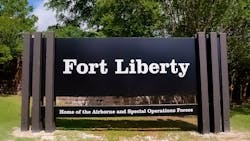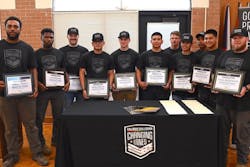Changing Lanes: From the Military Life to the Auto Body Life
The bravery and sacrifices exhibited by active service members are truly admirable and often overlooked, reduced to the blanket phrase, “Thank you for your service.”
Caliber Collision has taken a significant extra step by helping service members transition from military to civilian life while working in the collision repair industry, providing a pathway to a career in collision repair. This initiative, called Changing Lanes, addresses both the tech shortage and the need for post-military careers. Changing Lanes, which started in 2016 through the Department of Defense’s SkillBridge program, recently celebrated the graduation of its 60th cohort.
What is SkillBridge?
In a search for the SkillBridge program on its website, service members can find training opportunities in sectors such as healthcare, transportation, data processing, and even in careers at NASA. There’s another sector/option that service members can explore, and you probably already guessed it: collision repair.
"Skilled trades, such as becoming a body technician, are in high demand," Andrew Vaccaro, director of apprenticeships at Caliber Collision, told FenderBender in an interview. “Those trades are really in high demand, and the earning potential and career advancement opportunities really are endless.”
They’re in high demand due to a nationwide tech shortage that is impacting not only collision repair but all blue-collar trades.
According to a 2023 TechForce Foundation report, there are over 30,000 unfilled collision repair technician positions, which is often blamed on a lack of interest by younger generations. A 2019 research study by Education Next states that between 1990 and 2009, as the average number of academic credits high school students earned increased, the number of vocational credits dropped by 14 percent, or roughly two-thirds of a year of vocational studies.
Luckily, there is a rebound taking place because, according to a study by the National Student Clearinghouse Research Center, public two-year colleges with a strong focus on vocational programs experienced a 13.6% growth for the second consecutive year. These schools now make up 19.5% of all public two-year college enrollments, up from 15.3% in 2019.
POV
There can still be more than one solution for a single problem, and that’s where Changing Lanes comes in, because it provides active-duty service members with the skills and training needed to become body technicians. Over 15 weeks at Caliber Academy, participants gain hands-on experience and certifications before transitioning into Caliber’s Technician Apprenticeship Program (TAP) for further training and development.
Vaccaro said Changing Lanes began and continues to take place in Fayetteville, North Carolina. Participants are offered housing in nearby Fort Liberty. The program was born out of a desire to support service members transitioning to civilian life, a mission close to Vaccaro’s heart, given his father's military background. “If I can help support our servicemen and women who sacrifice so much, it’s very important to me to be part of this program,” Vaccaro said.
Service members interested in the program work with their transition assistance offices to find opportunities with Caliber. Once accepted, they relocate to Fayetteville for the 15-week training period, where they receive hands-on training from experienced instructors, some of whom are veterans themselves. Upon completion, participants can be placed in any of the 39 states where Caliber operates, ensuring broad accessibility and support.
Success and Victory
“I actually found out that one of our Changing Lanes graduates became a general manager at a center,” Vaccaro said. “So there's opportunity, there’s upward mobility at Caliber.” Of course, the skills obtained through Changing Lanes, as well as TAP, are transferable to any collision repair center or body shop. TAP was created with the purpose of tackling the nationwide tech shortage after all.
Caliber provided a testimony about the program by a recent Changing Lanes graduate and current Caliber Body Technician:
“We’ve invested one and a half million dollars in the last 18 months into the Changing Lanes program directly and invested $2 million over the next couple of years,” Vaccaro said. Since Changing Lanes’ inception, Caliber has invested over $5 million into the program.
The company is also expanding the program to include new locations and additional training opportunities, such as a formal glass program at Camp Pendleton in California.
The program has already seen remarkable success, with over 100 graduates securing full-time jobs at Caliber in the last 18 months alone.
FenderBender covered TAP last year as the program has been instrumental in addressing the industry's skill gap and providing career opportunities for many aspiring technicians who often start off with very little knowledge about auto body repair. Veterans can be seen as more appealing to attract into the industry.
“These are high-skilled positions that are only becoming more high-skilled,” Vaccaro added. “As you know, the industry becomes more advanced, and technology continues to develop. Active-duty service members are highly skilled people that are perfect for these positions.”
About the Author
Abdulla Gaafarelkhalifa
Abdulla Gaafarelkhalifa is a former associate editor at FenderBender and ABRN. He has a bachelor’s degree in English from the University of Wisconsin-La Crosse and has covered various beats beyond collision repair news such as politics, education, sports, and religion. His first car was a silver 2009 Chrysler Sebring, which he nicknamed the Enterprise because he’s a Star Trek fan. He now drives a 2014 Jeep Cherokee in order to tolerate Minnesota winters.


